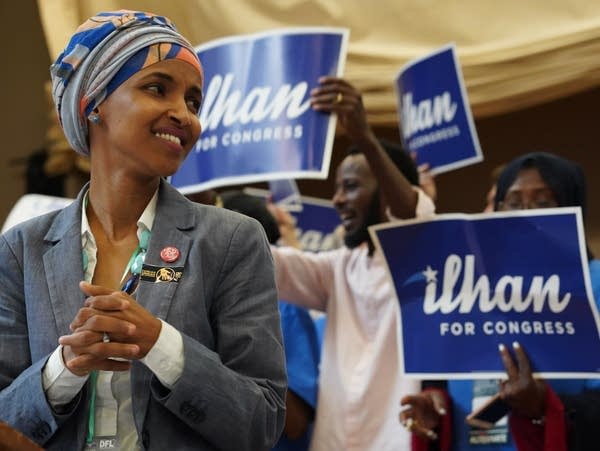Running for office, Muslim women hope voters will see more than faith and gender
Go Deeper.
Create an account or log in to save stories.
Like this?
Thanks for liking this story! We have added it to a list of your favorite stories.

When President Trump first announced restrictions on travelers from Muslim countries, Fardousa Jama attended a rally at a Mankato coffee shop. She was there with other community activists who were trying to come up with a way to respond to the so-called Muslim ban.
A state representative whom Jama declined to identify suggested that people wear a head covering, or the hijab, to show support.
"And the comment that was made came from a person who is a leader, who is in that position," she said. "To me, that shows the disconnect with your constituents — if you can tell us that the best way you can show support to your fellow Muslim is to put on a scarf."
Jama went home that night and talked to her father about it.
Turn Up Your Support
MPR News helps you turn down the noise and build shared understanding. Turn up your support for this public resource and keep trusted journalism accessible to all.

"And he's like, 'Well, then, if it bothers you that much, then why don't you bring your voice to the table?'" she recalled. Now she's among a dozen or so Minnesota Muslims who are attempting to do just that. A handful of those are women.
Jama, 33, immigrated from Somalia as a child. She grew up in Mankato and moved back after college. She founded a nonprofit organization, Somali Community Baarwaqo Organization, that helps Somali immigrants settle in the community — providing information about jobs, health care and education.
Reached by phone, Jama was at Mankato West High School for a performance by the Somali-British musician Aar Maanta.
Maanta has been visiting Minnesota in recent years for a residency program that connects artists with the community. But he was denied a visa to visit last year.
Jama said community activists worked to help him get his visa. She said it's that type of work that motivates her to serve in public office.
Jama is an immigrant, a millennial, a woman, and a person of color. She said she cares not only about minority issues, but other issues like affordable housing and education as well.
Now she's running for a seat on the Mankato City Council. Of the Muslims in contention for elected office this year in Minnesota, most of the women are advancing from primary victories to the general elections.
The positions range from school boards to Congress — with state Rep. Ilhan Omar seeking to replace Keith Ellison in the U.S. House, now that he's running for attorney general.

Omar was an inspiration to many of the women running this year. She's appeared on magazine covers and the Daily Show. She checks the box for multiple "firsts" — the first Somali-American Minnesota legislator, the first woman wearing a headscarf to serve in the House. And she may be about to become the first woman of color to represent Minnesota in Congress.
Although her district is primarily Democratic and a lot of her constituents are Somali immigrants, the women seeking office take inspiration from her, thinking that if she can do it, they can too.
"A lot of times, we women doubt our ability to do things when we're overqualified," said Hodan Hassan, a mental health clinician running for a state House seat in Minneapolis. "Whereas men, even when they're underqualified, they still think they can do it."
Hassan's views are echoed in a Sept. 20 Pew Research Center survey that found women are "increasingly doubtful that voters are ready to elect more female leaders." The survey also says women are more likely than men to experience barriers and uneven expectations.
Hassan said that at first she wasn't sure she wanted to run for state representative.
"I'm a perfectionist at heart," she said. "Can I do this job sufficient enough to my standards that I'll think I'm doing a good job? And will I be able to represent people well and make sure their voices are heard?"
For some local races, the candidates run unopposed. The Minneapolis School Board district races are an example of that.
Sharon El-Amin says it bothers her that 36,000 students aren't well represented and that she hasn't heard from the candidates who are running unopposed. El-Amin, on the other hand, is running for one of two at-large positions against three other challengers.
While some women of color say they've received racist comments about their election bids. El-Amin said it's important for such candidates to emphasize their assets.
"I think sometimes that we forget about the power that we hold and the things that we can bring together when it comes to building, bringing people together, standing up for what's right," she said. "Those are all things that we as women have a natural way of doing."
El-Amin was a restaurant owner in north Minneapolis for 15 years. She's been a resident of the community for 30. Now she works for the Hennepin County Sheriff's Office.
"So while my name is new in the field of becoming an elected official, it's not new to the city," she said. "So as a black Muslim, it just gives me more of a strong approach to go into the election. Again helping me to be more confident, stand behind my belief and what I represent and just fighting for what's right for our children and our families."
These women aren't just representing a local trend, they're part of a national trend of women running for office this year. They just happen to be Muslim.


